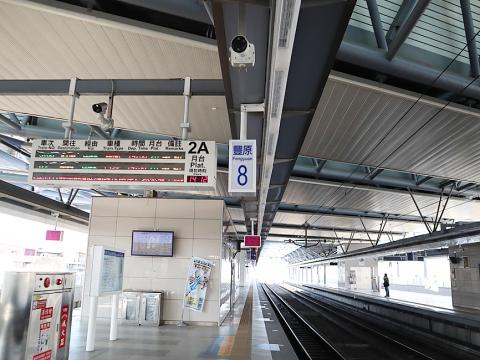The Taiwan Railways Administration (TRA) yesterday said that it would not activate the facial-recognition feature of its new smart surveillance system after lawmakers voiced their concerns over privacy issues.
The railway operator on Tuesday announced that it would soon start testing a smart surveillance system at Fengyuan Railway Station in Taichung.
The company said that the system would be mainly used to ensure the safety of passengers in and around railway stations — including detecting any intrusion onto the railway tracks and other restricted areas, abnormal loitering of individuals on the platforms or inside buildings, and suspicious packages — but lawmakers raised concerns that the facial-recognition technology would infringe on people’s privacy.

Photo: Ou Su-mei, Taipei Times
Chinese Nationalist Party (KMT) Legislator Ko Chih-en (柯志恩) said that the Democratic Progressive Party (DPP) administration has been critical of China for abusing human rights through the use of facial-recognition systems.
Ko asked if the administration of President Tsai Ing-wen (蔡英文) had learned from China by installing the technology to control the public.
DPP legislators sparked controversy in 2017 when they proposed a change to the Household Registration Act (戶籍法) that would legalize the use of iris-recognition systems by offices, Ko said.
The KMT caucus would have strongly opposed the use of facial-recognition technology if the TRA did not acceptably define the conditions under which the technology would be used, Ko said, adding that she was glad that it had decided not to activate the functionality.
KMT Legislator Jason Hsu (許毓仁) said that the Hollywood movie Enemy of the State shows how a government could control people through the mass collection of data and monitoring their whereabouts using surveillance devices.
“China has used surveillance devices to enforce a social credit rating system, while Hong Kong uses the devices to monitor pro-democracy protesters. Is it not strange that what DPP is planning to do is also what China is doing?” Hsu said.
Constitutional interpretations by the Council of Grand Justices have determined that the police cannot stop and frisk individuals without a legitimate reason, and that people have the right not to be monitored in public places, Hsu said.
However, the facial-recognition technology would enable the government to monitor people closely, like “watching goldfish in a transparent fish tank,” he said.
Following the criticism, the Taiwan Railways Administration said that it would not activate the facial-recognition technology, nor would the Railway Police Bureau.
“We will continue to build an environment that is friendly to all railway passengers while ensuring the safety of the transportation system,” the company said.

DAREDEVIL: Honnold said it had always been a dream of his to climb Taipei 101, while a Netflix producer said the skyscraper was ‘a real icon of this country’ US climber Alex Honnold yesterday took on Taiwan’s tallest building, becoming the first person to scale Taipei 101 without a rope, harness or safety net. Hundreds of spectators gathered at the base of the 101-story skyscraper to watch Honnold, 40, embark on his daredevil feat, which was also broadcast live on Netflix. Dressed in a red T-shirt and yellow custom-made climbing shoes, Honnold swiftly moved up the southeast face of the glass and steel building. At one point, he stepped onto a platform midway up to wave down at fans and onlookers who were taking photos. People watching from inside

MAKING WAVES: China’s maritime militia could become a nontraditional threat in war, clogging up shipping lanes to prevent US or Japanese intervention, a report said About 1,900 Chinese ships flying flags of convenience and fishing vessels that participated in China’s military exercises around Taiwan last month and in January last year have been listed for monitoring, Coast Guard Administration (CGA) Deputy Director-General Hsieh Ching-chin (謝慶欽) said yesterday. Following amendments to the Commercial Port Act (商港法) and the Law of Ships (船舶法) last month, the CGA can designate possible berthing areas or deny ports of call for vessels suspected of loitering around areas where undersea cables can be accessed, Oceans Affairs Council Minister Kuan Bi-ling (管碧玲) said. The list of suspected ships, originally 300, had risen to about

A Vietnamese migrant worker yesterday won NT$12 million (US$379,627) on a Lunar New Year scratch card in Kaohsiung as part of Taiwan Lottery Co’s (台灣彩券) “NT$12 Million Grand Fortune” (1200萬大吉利) game. The man was the first top-prize winner of the new game launched on Jan. 6 to mark the Lunar New Year. Three Vietnamese migrant workers visited a Taiwan Lottery shop on Xinyue Street in Kaohsiung’s Gangshan District (崗山), a store representative said. The player bought multiple tickets and, after winning nothing, held the final lottery ticket in one hand and rubbed the store’s statue of the Maitreya Buddha’s belly with the other,

Japan’s strategic alliance with the US would collapse if Tokyo were to turn away from a conflict in Taiwan, Japanese Prime Minister Sanae Takaichi said yesterday, but distanced herself from previous comments that suggested a possible military response in such an event. Takaichi expressed her latest views on a nationally broadcast TV program late on Monday, where an opposition party leader criticized her for igniting tensions with China with the earlier remarks. Ties between Japan and China have sunk to the worst level in years after Takaichi said in November that a hypothetical Chinese attack on Taiwan could bring about a Japanese